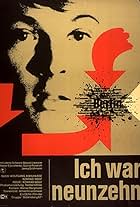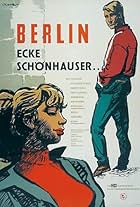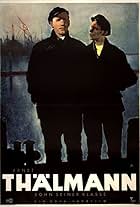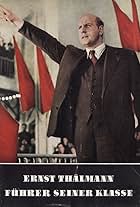DEFA
Aktivität auflisten
174 Mal angesehen
• 1 in dieser WocheEine neue Liste erstellen
Liste deine Auswahl an Filmen, Serien und Prominenten auf.
- 50 Titel
- RegisseurJoachim KunertFilmstarsKlaus-Peter ThieleManfred KargeArno WyzniewskiZwei Teenager werden in Hitlers Armee eingezogen. Der eine wird zum Fanatiker, der andere erkennt die Sinnlosigkeit des Krieges.
- RegisseurKonrad WolfFilmstarsPeter PragerUwe ZerbeEberhard KirchbergFour young Germans in a Soviet POW camp decide to join the Red Army to hasten the end of the war. Their new identities elicit different reactions from Germans and Russians, and are difficult to live up to when they are sent behind German lines.
- RegisseurKonrad WolfFilmstarsJaecki SchwarzVasiliy LivanovAleksey EybozhenkoGregor Hecker, who fled Germany with his parents, returns to Germany as a lieutenant in the Red Army.
- RegisseurKonrad WolfFilmstarsUlrike von ZerboniGünther SimonErwin GeschonneckPeople are sent off to a Soviet controlled uranium mine in 1950's Germany.
- RegisseurEgon GüntherFilmstarsMarita BöhmeGünther SimonKlaus PiontekThe marriage of Katrin and Richard Lot has become a routine. She has a career and he, as a Marine officer, comes home only once every fourteen days. The children greet him with joy, but she greets him only with anxiety because their marriage is missing its key: love. She wants a divorce, but he refuses mainly out of comfort as well as due to remarks from the party. Katrin finds a strange solution. She shoplifts and is put on probation for three months. This is enough to force Richard into a divorce, because he is concerned about the "moral liability" of his wife. Katrin gets her way and is promised custody of her children. Because of her thievery, she can no longer be a teacher, but at least she is free and doesn't need to live a lie anymore.
- RegisseurKurt MaetzigFilmstarsAngelika WallerWolfgang WinklerAlfred MüllerThe Rabbit Is Me was made in 1965 to encourage discussion of the democratization of East German society. In it, a young student has an affair with a judge who once sentenced her brother for political reasons; she eventually confronts him with his opportunism and hypocrisy. It is a sardonic portrayal of the German Democratic Republic's judicial system and its social implications. The film was banned by officials as an anti-socialist, pessimistic and revisionist attack on the state. It henceforth lent its name to all the banned films of 1965, which became known as the "Rabbit Films." After its release in 1990, The Rabbit Is Me earned critical praise as one of the most important and courageous works ever made in East Germany. It was screened at The Museum of Modern Art in 2005 as part of the film series Rebels with a Cause: The Cinema of East Germany.
- RegisseurRichard GroschoppFilmstarsUlrich TheinArno WyzniewskiPaul BerndtAugust 1961. The former Foreign Legionnaire, King, has collected a gang of hooligans, with whom he creates mischief in the GDR. After some careless work on a construction site, an event during which two people lose their lives, they move to a campsite on the Baltic Sea. With sputtering mopeds, loud radios, and occasional outbursts, the gang makes the vacationers' lives living hell. Unfortunately for them, Lieutenant Czernik discovers the connection between them and the accident at the construction site. To stop them from fleeing to West Berlin, Lieutenant Czernik and the police need to arrest them, one at a time, with King as the last.
- RegisseurWolfgang SchleifFilmstarsHans QuestIlse SteppatAlexander EngelA biography of Johann Friedrich Böttger, who in 1709 invented the first white porcelain in Europe. The apprentice apothecary and assistant to a "gold producer" fled from the Prussian King - into Saxony. But there he finds King Frederick August the Strong after him: the young man is told to produce gold for the king, and is thus brought to a fortress and equipped with everything he would need for the task. Naturally, Böttger has known for a while that actual gold production is a myth and instead experiments with porcelain; it should be as white as it is in China, he figures. Once he finally succeeds in surprising the King with the "white gold," he vainly hopes for freedom... a tragic error.
- RegisseurKurt MaetzigFilmstarsPaul BildtFritz TillmannWilly A. KleinauBased on the 1947 book "I.G. Farben", by American author Richard Sasuly, and records from the Nuremberg Trial of the chemical giant I.G. Farben, Council of the Gods is a story about the collaboration between international corporations and German scientists, whose research contributed to the death of millions. Featuring music by Hanns Eisler, electronic sound by Oskar Sala (Hitchcocks's "The Birds") and a script by Friedrich Wolf, the film is powerful in its depiction of the moral dilemmas and lessons of the war, as well as of Cold War propaganda. Chemist Dr. Hans Scholz lives through a tortuous political transformation and maturation process. Finally, he becomes wrapped up in his political neutrality and closes his eyes to the fact that poison is being produced in his factory. Standing before the judges at the Nuremberg trials he has to face the fact that he was partly responsible for the deaths of millions in the gas chambers of the extermination camps.
- RegisseurKonrad PetzoldFilmstarsHorst JonischkanErik VeldreDoris AbeßerFritz Weineck, a worker's son from Halle, loves music - and dreams to make a living out of it one day. When his friend Alfons, a World War I veteran, gives him a trumpet as a gift, Fritz seems to come closer to fulfill his dream.
- RegisseurGerhard KleinFilmstarsIlse PagéEkkehard SchallHarry EngelDie Geschichte einer Gruppe rebellischer Teenager aus Ost-Berlin.
- RegisseurKurt MaetzigFilmstarsGünther SimonHans-Peter MinettiErich FranzThis historical-biographical film begins in the first days of November 1918 on the western front. News comes to the soldiers of a revolutionary uprising in Kiel. Young Thälmann, a soldier against his will, would like to join the expanding conflict on the side of his comrades in Hamburg. As the revolution becomes threatened by the betrayal of the right-wing Social Democrats and the splintering of the working class, he nevertheless tries unremittingly to unite the workers. The reactionaries grow ever stronger and the neediness of ordinary people multiplies. In this dire situation, the Hamburg police commissioner would like to block the unloading of a ship full of provisions that were sent from Petrograd as a message of solidarity. But Thälmann prevails in unloading it. The high point and conclusion of the first part of the Thälmann films is established at the Hamburg Uprising in October 1923.
- RegisseurKurt MaetzigFilmstarsGünther SimonHans-Peter MinettiKarla RunkehlThe second part of the Ernst Thälmann films encompasses the time period between 1930 and Thälmann's murder in 1944. It shows Thälmann's battle to achieve a united front with all German workers against the National Socialists, his arrest following Hitler's seizure of power and the eleven years of his incarceration, in which he is unwavering in his beliefs until his death. An attempt to free him on the part of his comrades ends disastrously, and a corrupt offer of freedom from Göring himself receives Thälmann's refusal. He must also witness how his brave fellow Socialist Aenne Jansen in the women's prison across from his tragically loses her life during a bombing raid. The second primary character of the film is Aenne's husband Fiete Jansen, who already proved his loyalty to Thälmann's side as a friend and fighter in the first part. As the commander of the Thälmann Battalion, he fights in Spain on the side of the people and later in the ranks of the Red Army toward a speedy end to the war against Fascism.
- RegisseurFrank BeyerFilmstarsManfred KrugKrystyna StypulkowskaJutta HoffmannEin Film über die Arbeits- und Lebensbedingungen in der DDR der 60er-Jahre. Eine kleine Liebesgeschichte ist natürlich eingeschlossen.
- RegisseureGérard PhilipeJoris IvensFilmstarsGérard PhilipeJean VilarFernand LedouxTyll Ulenspiegels Abenteuer im Kampf gegen die spanischen Besatzer unter Führung des Herzogs von Alba.
- RegisseurGerhard KleinFilmstarsAnnekathrin BürgerUlrich TheinUwe-Jens PapeDie 16-jährige Ostberlinerin Uschi (Annekathrin Bürger) lernt im HO-Bekeidungswarenhaus am Alexanderplatz den Beruf einer Verkäuferin. Als sie bei einer Modenschau Kleider vorführen darf, kommt sie auf die Idee, Mannequin zu werden. Aber ihre Eltern (Erika Dunkelmann und Erich Franz) sind damit nicht einverstanden. Eines Tages begleitet Uschi ihre Freundin nach Feierabend wieder mal in den Westsektor der Stadt. An einem Stand möchte sie sich etwas zum Naschen kaufen. Der Händler will zwar ihr Ostgeld annehmen, aber den Schein nicht wechseln. Das bekommt ein in der Nähe stehender junger Mann mit und bezahlt die Summe. "Lord" (Uwe-Jens Pape), seine lustige, unbekümmerte Art und auch sein Kofferradio gefallen Uschi, und sie geht noch ein Stück mit ihm spazieren. Er und sein Freund Hans (Ulrich Thein) wohnen im Westsektor und verdienen ihr Geld mit dem Waschen von Luxuslimousinen. Für Hans ist Uschi Liebe auf den ersten Blick. Als die Autowäscherei eines Tages dicht macht und "Lord" Berlin verlässt, ergreift Hans seine Chance bei der jungen Frau. Mit seiner ruhigen, zuverlässigen Art verzeichnet er bald Erfolge, und es entwickelt sich zwischen beiden eine zarte Liebe. Nach mehreren erfolglosen Versuchen findet er eine neue Arbeit bei einem Abbruchunternehmen. Er ermutigt Uschi, sich bei einer Mannequinschule anzumelden und übernimmt die Kosten. Sie verbringen sehr viel Zeit miteinander, und eines Tages, während eines starken Regens, geht Hans mit ihr in die Wohnung eines Freundes. Uschi vermutet, dass es seine ist, doch auch er wohnt noch bei seiner Mutter (Marga Legal). Da Uschi immer öfter spät nach Hause kommt, gibt es Ärger mit ihren Eltern. Nach einem heftigen Streit beschließt sie, zu Hans zu ziehen. Doch in seiner vermeintlichen Wohnung öffnet eine junge Frau, die ihr erklärt, dass Hans gar nicht hier wohnt. Mit einem Hoffnungsschimmer für eine gemeinsame Zukunft endet die Liebesgeschichte zweier junger Menschen - einem Mädchen aus Ostberlin und einem jungen Mann aus dem Westsektor der Stadt. Die noch vor dem Mauerbau entstandene Komödie steht in ihrer unpathetischen Romantik dem italienischen Neorealismus nahe und ist ein hochinteressantes Zeitdokument. Für Regisseur Gerhard Klein war Hauptdarstellerin Annekathrin Bürger eine Notbesetzung. Doch die damals 17-Jährige bescherte dem Film mit ihrer unbekümmerten, natürlichen Ausstrahlung großen Erfolg beim Publikum. Die Rolle der Uschi in "Eine Berliner Romanze" wurde zum Auftakt ihrer großartigen Schauspielkarriere - und aus der Romanze im Film wurde auch im wirklichen Leben Liebe: Annekathrin Bürger und ihr Filmpartner Ulrich Thein waren bis 1961 ein Paar.
- RegisseurFrank BeyerFilmstarsAnnekathrin BürgerArmin Mueller-StahlUlrich TheinSet in the historical context of anti-Nazi resistance, this love story explores the moral issues of the period. Beyer's second antifascist film, it stands out stylistically due to the clear references to the work of Tarkovsky.
- RegisseurHorst ReineckeFilmstarsRenate KüsterPaul R. HenkerRolf Möbius
- RegisseurHans LuckeFilmstarsJohannes ArpeTheresia WiderElfriede FlorinParty secretary Ernst Wollni (Bruno Carstens) is supposed to promote the development of an LPG in his home village, but he gets a lot of opposition from his old childhood friend Fritz Grimmberger (Johannes Arpe).
- RegisseurMilo HarbichFilmstarsUrsula VoßFritz WagnerHerbert WilkAt the end of WW2 Mrs. Jeruscheit has lost her home. Like millions of others she treks west, burying one of her children on the way. She finds new purpose in life settling on an abandoned farm and working together with locals and refugees.
- RegisseurGeorg LeopoldFilmstarsPeter HerdenHelga RaumerAngelica Domröse
- RegisseurRalf KirstenFilmstarsManfred KrugChristel BodensteinPeter Reusse
























